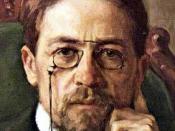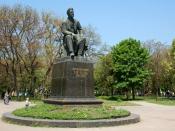Ambiguity
Anton Chekhov's short and fictional stories played an important role in the history of literature. Chekhov's writings marked the transformation into the modern form with modern ideas. His work was marked as profound works of literature, such as his short story, "The Lady with the Dog", which was called one of the greatest stories ever written. Along with good reviews often comes criticism. Karl Kramer, a critic and the author of "Stories of Ambiguity" argues that the ambiguity in the story is whether Gurov changes or not. Clearly seen in the story, the ambiguity lies in the ending, just as Anton Chekhov intended it to. Therefore the ambiguous element is the ending of the story and not whether Gurov changed or not.
Karl Kramer's argument is that the ambiguity is that we are not sure Gurov changes. He believes that the ending is defined but whether Gurov changed or not is left entirely up to the reader and their interpretation of the story.
For example, Kramer states in his essay that " the fundamental question which lies before Gurov at the end of the story is not what he and Anna will do in the future, but rather precisely what kind of relationship exists between them" (349). According to Kramer's view of the ending, the reason Chekhov wrote the ending the way that he did was to make the reader wonder if a change in Gurov had occurred or not. The story had nothing to do with what decision Anna and Gurov would reach upon at the end, because the story is really about whether Gurov really falls in love with Anna and is he really becomes capable of love. In addition, Kramer also asks the question, "is this a new experience for Gurov, or is it...



Nice
Nicely written a little dry though but most world literature is so what ya gonna do...am I right. Well anyway bravo keep it up oo ya and stay in school lol
1 out of 1 people found this comment useful.